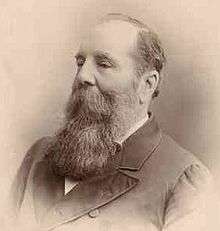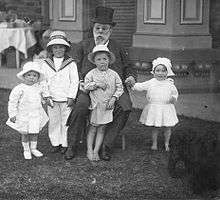Edwin Thomas Smith




Sir Edwin Thomas Smith KCMG (6 April 1830 – 25 December 1919)[1] was an English-born South Australian brewer, businessman, councillor, mayor, politician and benefactor.
Early years
Smith was born on 6 April 1830 at Walsall, Staffordshire, England, the son of Edwin Smith.[1] He was educated at Queen Mary's Grammar School, Walsall, and on leaving school had business experience with an uncle. When only 20 years of age Smith was taking part in local politics.
Emigration
In 1853 Smith emigrated to South Australia aboard the California[1] and began business as an importer of ironmongery at Adelaide, initially collaborating with his cousin James Alexander Holden.[2]
On 25 June 1857 he married Florence, daughter of Robert Stock of Clifton, England. They had two children, a boy and a girl. Florence died in 1862.
Brewer
In 1860 he went into partnership with Edward Logue[3] of the Old Kent Brewery. When Logue died in 1865, Smith successfully continued the business. In 1876 he moved the business to the Kent Town Brewery at the eastern end of Rundle Road. The malt towers of the brewery have now been turned into luxury apartments overlooking the Adelaide Park Lands and Adelaide city centre. In 1888 he amalgamated his business with that of William Knox Simms to form the South Australian Brewing Company.[4][5]
Local government
He took part in municipal government, was Mayor of Kensington and Norwood (later incorporated within City of Norwood Payneham & St Peters), 1867–70, and 1871–73, and then was elected to the Adelaide City Council. He served three terms as Mayor of Adelaide in 1879–82, 1886–87 and 1887-88.
In the city council he was always anxious to improve the city and it was a result of his advocacy that Adelaide had its first tramways, King William Street was extended, and the Torrens Lake was formed.
Member of the House of Assembly
Smith entered parliament in 1871 as member for East Torrens in the South Australian House of Assembly, and except for a year while he was visiting England, continued to represent this constituency until he retired in 1893. Though an active member of parliament he was not anxious for office, and only once was included in a government; he was Minister for Education in the Bray ministry from March to June 1884. He was, however, responsible for some useful legislation including a first offenders act, and he took a leading part in the promotion of the Adelaide Jubilee International Exhibition of 1887-88. For this and his other services to the colony he was knighted (KCMG) in 1888.
In 1894 he gave the city a bronze statue of Queen Victoria, which was placed in the geographic centre of Adelaide in the centre of Victoria Square.
Member of the Legislative Council
Smith was elected to the South Australian Legislative Council as member for Southern Districts in 1894 and remained a member until 1902.[1] During the whole of his parliamentary experience he never lost an election.
Retirement
Smith retired from the active conduct of his business in 1888, and retired from parliament in 1902. In retirement he took a great interest in a large number of institutions, to many of which he gave both time and money. He was chairman of the national park commissioners, and a trustee of the Savings Bank of South Australia. He was an active worker in the management of the blind, deaf and dumb institution, the Adelaide hospital, the old colonists association, the Elder workmen's homes, the botanic gardens, and the zoological gardens. He was a patron or office-bearer in every important Adelaide sporting organisation, was president of the South Australian Cricket Association for about 30 years, and during that period seldom missed a committee meeting. He was a regular churchgoer and for many years a deacon of Clayton Congregational Church, Kensington.[6] His public benefactions were many and included £2,000 to clear the debt off the Norwood Oval, £2,000 for the Blind, Deaf and Dumb Institution, £1,000 to start an insurance fund for the Commercial Travellers' Association, and many other private benefactions. Without any pretensions to oratory or great learning, but with an excellent conception of what would be worthwhile and feasible, Smith laboured all his life for the good of his community.
Smith died of a cerebral haemorrhage on 25 December 1919 at his home, "The Acacias", in the eastern Adelaide suburb of Marryatville.[1] He married twice, first in 1857 to Florence Stock, who died in 1862, and second in 1869 to Elizabeth Spicer, who died in 1911. He was survived by a son and a daughter of the first marriage.
Legacies
Norwood Football Club
When the Norwood Football Club decided in December 2005 to set up a "Hall of Fame", Smith was appointed one of the 10 non-playing inaugural members.[7] "Sir Edwin Thomas Smith was patron of Norwood from the club’s first day in 1878 until his last, Christmas Day 1919". "More than any other individual, Sir Edwin ensured that the club built its early sporting life on solid foundations".[8]
Adelaide Oval
The Sir Edwin Smith Stand at the Adelaide Oval was named in his honour in 1922. One of the roads leading up to the Oval is Sir Edwin Smith Way.
The Acacias
On his death in 1919, his home on the corner of Portrush and Kensington Roads Marryatville became Loreto Convent, then later Loreto College.
Sir Edwin Smith bought the property in 1878 and added extensively to it.
References
- 1 2 3 4 5 Helen R. Pearce, 'Smith, Sir Edwin Thomas (1830 - 1919)', Australian Dictionary of Biography, Vol. 6, MUP, 1976, pp 142–143. Retrieved 21 January 2010
- ↑ Marc McInnes. "The Holden Family" (PDF). Retrieved 26 February 2016.
- ↑ Edward Logue 1821-1865, The Family of Ian Redpath and Maxine Pitt
- ↑ Alison Painter, 25 December 1897/1919 W.K. Simms and E.T. Smith, Professional Historians Association (South Australia)
- ↑ Alison Painter 26 September 1980 West End Brewery Professional Historians Association (South Australia)
- ↑ "Clayton Congregational Church". The Register (Adelaide). LXXIV, (19,422). 11 February 1909. p. 6. Retrieved 4 October 2016 – via National Library of Australia.
- ↑ Hall of Fame inductees, Hall of Fame Dinner, 12 August 2006, Norwood Football Club.
- ↑ Sir Edwin T. Smith KCMG, Hall of Fame, Norwood Football Club.
- Serle, Percival (1949). "Smith, Edwin". Dictionary of Australian Biography. Sydney: Angus and Robertson.